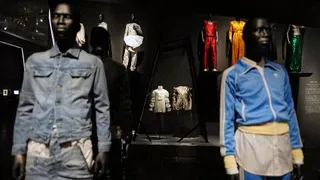November 28, 2011
Sandusky Charges Bring Focus on Pa. Sex Crime Laws
Jason St. Amand READ TIME: 4 MIN.
Plainly stated, the most serious of the 40 criminal charges lodged three weeks ago against Jerry Sandusky are that he sexually attacked young boys, subjecting them to anal and oral sex.
That may sound to many people like a case of rape, but police and prosecutors turned instead to a different section of Pennsylvania's criminal code for the most serious of the sex offenses the former Penn State assistant coach faces.
Each of those seven felony counts of involuntary deviate sexual intercourse carries a potential sentence of up to 20 years in prison, the same as rape.
The question of whether to "call a rape a rape," as New York Times ombudsman Arthur S. Brisbane put it last week, comes down to the finer points of Pennsylvania state law, discretionary decisions made by police and prosecutors and the necessarily politically charged language of sex in general and violent sexual offenses in particular.
Legal experts say the Pennsylvania definition of the two crimes overlap considerably, but the legal definition of involuntary deviate sexual intercourse, which pertains to anal and oral sex, any type of sex with an animal, and penetration with foreign objects, covers behavior different from a rape involving vaginal sex between an adult man and woman.
Forced anal sex can be charged as rape. It's not unusual for the two offenses to be lodged together for a single criminal act.
The decision about whether to charge rape or IDSI, as it is often referred to, can be a matter of courtroom tactics. Prosecutors sometimes worry that in scenarios such as the Sandusky allegations, where there has not been male-female vaginal sex, jurors can balk at declaring it rape.
"The layperson considers rape in terms of ordinary sexual intercourse," said northwestern Pennsylvania District Attorney Francis J. Schultz, president of the state prosecutors' association. "In Crawford County, we would choose the more specific offense if we were talking about anal or oral. We're going to charge IDSI. And it probably varies from prosecutor's office to prosecutor's office."
Gary Asteak, a criminal defense lawyer in Easton, prefers the term rape to involuntary deviate sexual intercourse for clarity's sake.
"Let's call it what it is," Asteak said. "IDSI is kind of a long term. ... It's a whole lot easier to say rape."
Even within the IDSI statute, there are different ways to charge. Sandusky's IDSI counts were filed under a provision that applies when victims are under age 16 and the perpetrator is at least four years older, but not the victim's spouse.
The grand jury report issued when Sandusky was charged Nov. 5 lists eight purported victims, all boys, none identified by name.
Involuntary deviate sexual intercourse was charged in relation to four of them: "victim 1," a boy he allegedly fondled and engaged in oral sex with; "victim 2," an as-yet unidentified child whom another coach reported seeing subjected to anal sex in the team showers; "victim 4," who prosecutors say became a fixture in the Sandusky household, and whom Sandusky is accused of trying to penetrate orally and anally; and "victim 6," also unidentified, who jurors said was seen by a janitor in the showers being subjected to oral sex.
The grand jury report said Sandusky performed oral sex on victim 1 more than 20 times in 2007-08, along with other allegations, but he was only charged with six total crimes in relation to that boy.
Bill Costopoulos, a defense attorney in Lemoyne, said those 20 separate allegations could have generated 20 counts, but there may have been other considerations when it came time to decide which charges to lodge.
"Once you start bringing in multiple counts, then the victim's going to have to get more specific with dates, times and places," Costopoulos said.
Asteak said prosecutors who file dozens and dozens of charges, which happens, can run the risk of being seen as piling on, and multiple counts can have diminishing value in the criminal court system when it comes time for sentencing.
"Sandusky has enough charges against him to put him away for the rest of his natural life, plus," Asteak said.
Sandusky also faces other charges for alleged acts that include touching a child's penis, grabbing a naked child in the shower and putting his hands down the waistband of a boy's pants without touching his genitals. The other counts are aggravated indecent assault, indecent assault, attempted indecent assault, unlawful contact with minors, endangering a child's welfare and corruption of minors.
If he is convicted of multiple charges for the same act, it's possible convictions on lesser offenses may merge when it comes time for sentencing.
He has denied the allegations against him, and a preliminary hearing is scheduled for next month.
The set of crimes in the Sandusky case, collectively, can be described appropriately as "child sex abuse," said Kristen Houser with the Pennsylvania Coalition Against Rape, which works with 51 rape crisis centers in the state and advocates on behalf of victims.
But she pointed to the use of "sex scandal" and "child abuse" in news accounts as an example of how imprecision in the language of sex crimes can serve to water down the seriousness of the allegations.
"What's ... important to us is that the sexual nature of the violations are included," Houser said. "When we see headlines calling it a 'Penn State sex scandal' - Tiger Woods, Bill Clinton, those are sex scandals. This is about sexual abuse of children."
She also said the children who police say were attacked by Sandusky should be referred to as "alleged victims" rather than "accusers."
Otherwise, she said, it "puts the onus back onto the alleged victim, and it helps put them under the spotlight. I believe it changes the focus (from) where it needs to be."
Her organization tries to defer to the people they serve when in making decisions about how to describe them.
"Some people will call themselves a victim, other people hate the word victim - 'I'm a survivor,'" Houser said.







